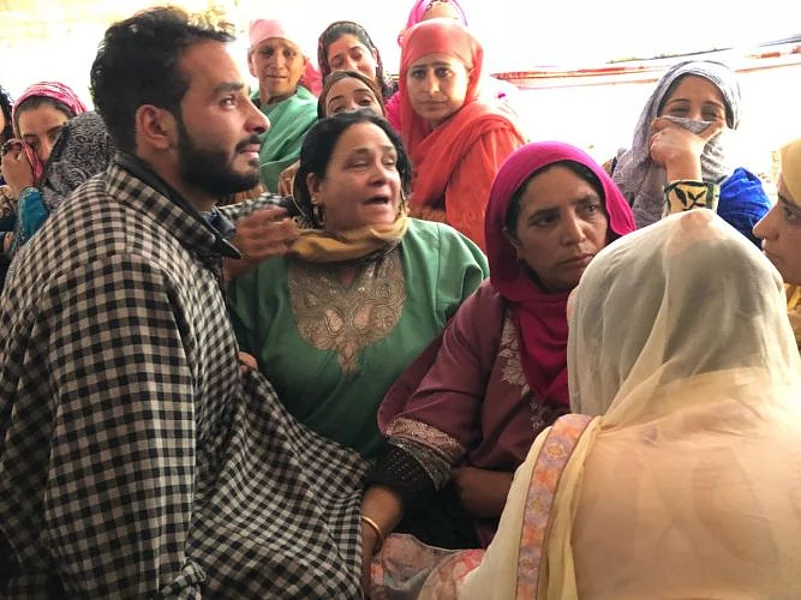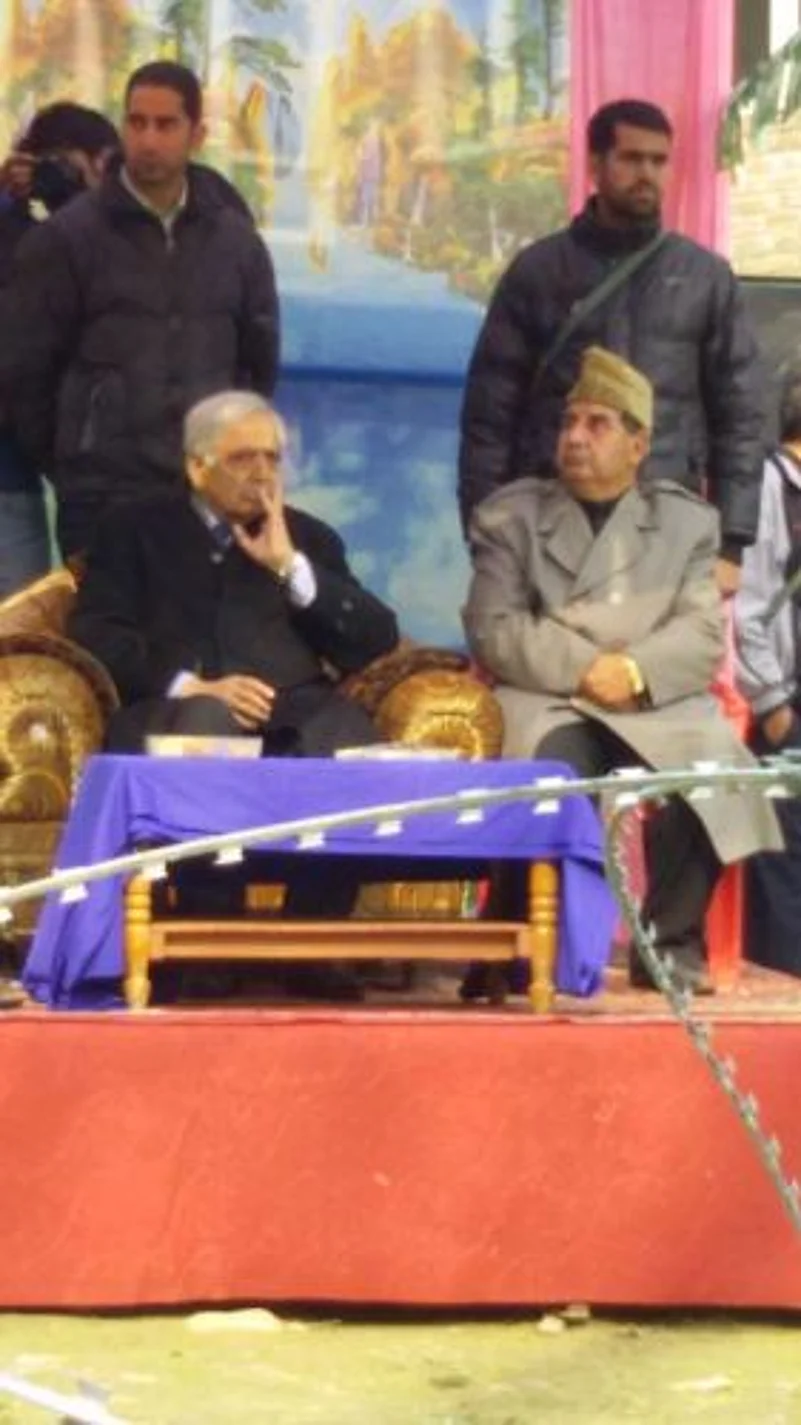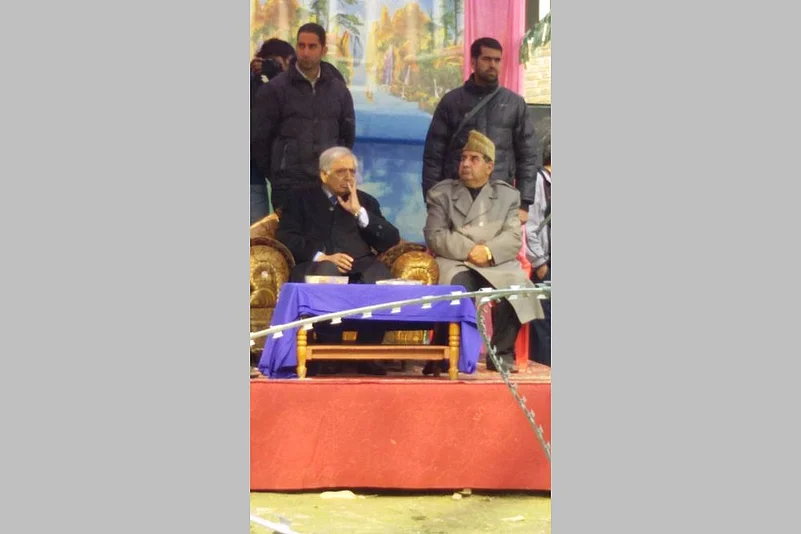As the last attempt, 67-year-old Ghulam Nabi Mir covered his face with his hands to save himself from bullets fired by suspected militants. But bullets hit his hands, his face too and other parts of his body. “My father in his defence from attackers might have put his hands before his face. Even his hands had bullet marks,” says his son Sartaj Ahmad Mir, 22, sobbing.
His father Ghulam Nabi Mir famously known as Ghulam Nabi Patel was killed on April 25, few meters away from his house. Former Indian National Congress and Peoples Democratic Party (PDP) leader, Patel, succumbed on way to the hospital. He was travelling in his Scorpio along with his two security personnel when, according to the police, the three militants suddenly appeared before his vehicle and fired several bullets at him. His face had received two bullets.
Advertisement

Long before when the militancy broke out in Kashmir in 1990, Patel left his job in the health department and joined Indian National Congress. In Pulwama, it is said that Congress leaders, who visited the area found him resembling Ahmad Patel. They started calling him Patel sahab. The name stuck.
PDP leader Waheed-ur-Rehman Parra, who is also from Pulwama, says at some time he had met Congress leader Ahmad Patel and with it, he became famous as Ghulam Nabi Patel. No one calls him Ghulam Nabi Mir. People would call him as Patel Sahab.
In the 1990s, when a number of workers and leaders of National Conference and Congress were targeted by the militants for their party affiliations, Patel preferred to step back and lived apolitical life in his native village.
Advertisement
But in 1995 he was kidnapped by Hizbul Mujahideen militant outfit. The family says after much effort they got him released safely from the militants after two days of custody. He remained in his home for next ten months. Later fearing that he could be killed like hundreds of the pro-India political party workers of National Conference and Congress, Patel migrated to Srinagar and then moved to Jammu.
Internal migration of the mainstream political workers from the rural areas of the Valley to Srinagar after they were targeted by militants in early 1990s and later the large-scale migration of Jamaat-e-Islami workers to Srinagar from rural areas after they came under attack of the counter-insurgents Ikhwan Muslimoon are the least discussed migrations in Kashmir. Human rights activists say excessive militarization, frequent crackdowns, killings by the security forces and human rights violations also led to the migration from the rural areas to Srinagar.
National Conference says nearly 10000 of its workers have been killed since the 1990s. “I think thousands of NC workers and lower rung leaders were killed since 1990,” says the NC spokesman Imran Nabi. His father, advocate Ghulam Nabi Dar was killed in a grenade blast in 2006. Ghulam Nabi Dar was NC’s MLA from Kulgam in 1977 and 1983. He lost the election to Muslim United Front candidate Abdul Razak Mir in 1987 elections, widely known as rigged elections that set off militancy in Kashmir when Farooq Abdullah became Chief Minister. Razak Mir, who was affiliated with Jamaat-e-Islami, was kidnapped in 1996 by “unidentified gunmen” from his home in Bachru area of Kulgam and later killed.
Advertisement
While Jamaat-Islami says counter-insurgents, Ikhwan-ul-Muslimoon, which was patronized by the Army and the SOG and the forces, killed its hundreds of workers in the rural areas promoting migration of Jamaat workers toward Srinagar. “We are compiling the list of the people killed but all I can say hundreds of our workers were killed”, says Zahid Ali, spokesman of Jamaat-e-Islami.
Like other political workers, Patel lived a life of migrant in Jammu. As the situation in South Kashmir become favourable for the pro-India politics, Patel returned to the Valley and joined Rashtriya Janta Dal, which was headed by Darakshan Andrabi. Andrabi is now in the BJP. He fought and lost elections. But he continued to live under security cover at the MLA quarters in Pulwama town. The MLA quarters are a dilapidated two-room apartment in main town Pulwama.
Advertisement
In 1999 when Mufti Mohammad Sayeed formed the Peoples Democratic Party (PDP), he joined the PDP. “On the insistence of Mufti Mohammad Sayeed he joined the party. He was one of the founder members of the PDP”, says Sartaj.
Patel again fell out from the PDP but joined back the party during 2014 Assembly Elections and campaigned for the PDP candidate Dr Haseeb Drabu, who won the election from Rajpora constituency and became Finance Minister in the coalition government of BJP-PDP.
As the large-scale protests broke out after the killing of 22-year-old militant commander Burhan Muzaffer Wani especially in south Kashmir’s four districts, once known as the stronghold of the PDP, and nearly 100 civilian protesters were killed and scores others blinded in the Valley, Patel blamed the government for the lack outreach. The angry party removed him last year for his statements, says a senior PDP leader.
Advertisement
However, Patel continued to be protected person having four Personal Security Officers. On April 25 like other low key politicians of the Valley, who visit their native villages in south Kashmir, Patel had asked his security guards not to carry weapons along as militants target politicians having security guards with weapons. The militants are facing a shortage of weapons. And he was killed as the security guards had nothing in their hands to fight back. Like other killings of the political workers in the Valley, Patel’s killings too would have passed off as one of such incidents. But when both the PDP and Congress disowned him, the opposition leader Omar Abdullah went to town to condemn them.
Advertisement
"How tragic that Patel Sahib, a political worker assassinated by militants in Kashmir is being disowned by both the PDP and Congress. If neither party is willing to own him as one of their own let’s just call him an NC worker so his death is not in vain," Omar said. “Ghulam Nabi Patel is being denied the dignity of having been assassinated for belonging to a political party just so the PDP and Congress can lie to their workers to claim they aren’t at risk from militant bullets.”
Later the BJP said he was their worker, which angered the family more. “He was with the PDP and we have proof to show it. Who will prefer to be with such a party if it disowns its own men when they get killed”, Sartaj asks, showing pictures of his father with the top PDP leaders including late Mufti Mohammad Sayeed. “He was not with the BJP”, Sartaj says realizing that the BJP has not any acceptability in the volatile region of south Kashmir.
Advertisement

The family is silent about his killers. Outside his house, a tent was pitched in the lawn on April 28 where people would come to express condolences. Locals say Patel in his long political career spanning over 40 years has not earned much wealth. Of his eight children from two wives, no one is in the government service, says one of his friends. “He would only help people, take them to politicians and officers to get their work done”, he says. In Shadimarg area most of the people spoke favourably about Patel and were sad about his killing. But in the same breath, they maintain silence when asked why he was killed. “We don’t know who killed him”, says the son, Sartaj. “He had no enemies”, he says.
Advertisement
At Shadimarg a fruit seller says Patel was a good man. “We don’t know who killed him. No militant group has claimed responsibility”, he says.
The government spokesman, Naeem Akhtar takes a broader look at such killings. “Tragedy of Kashmir”, he says, “is that the mainstream which has stuck its neck out whether for its belief or politics, but this is the only political forces which are out for India, for the fact of the Accession.” “And this is the only force which is one receiving end from both sides, from separatists and nationalists. The so-called nationalists in the country ask us to do more but they do not do anything that they are supposed to be doing. While the liberals in the rest of the country criticize Mehbooba Mufti for allying with the BJP not understanding the fact that BJP is now representing the new India. It is the fact and the Congress and other parties are following its (BJP’s) political discourse not opposing the basic fundamental ideas of the BJP”, he says. He says an inspiration of a militant in Kashmir is Jannat (heaven) and “those among us who get killed are getting killed for India, for our political beliefs.” “This doesn’t get registered anywhere. A political worker is not joining the parties to get killed.”
Advertisement
He says the inability of successive central governments to stand by the accords that entered with the mainstream political parties in Kashmir is the reason that leads to the killing of political workers. “Because they (political workers) are linked with the parties, which have entered into alliances with respected political forces in the country and ultimately when the accords are not honoured and are not delivered on the ground, these people face the brunt”, he says.
A senior police official says that when a militant from Telangana was killed in March this year at least three militant groups owned him. The Tehreek-ul-Mujahideen, Ansar-ul-Ghazwat-ul-Hind were first to claim him as their own. “Here no one was ready to own a man who had dedicated his life to the mainstream politics. Who will join mainstream politics if such is an attitude”, he says.
Advertisement
At Dangerpora the views of the police officer reflected the mood. Bashir Ahmad Khan, a shopkeeper pointing toward one storey house of Patel, says this is his property after being in the politics for decades together. “None of his children are in the government service. He was with Congress and with PDP and when he was killed they disowned him”, the elderly Khan, who knew Patel as neighbour and friend, says. “What is the use of this politics when even on death you are renounced”, he says.




















